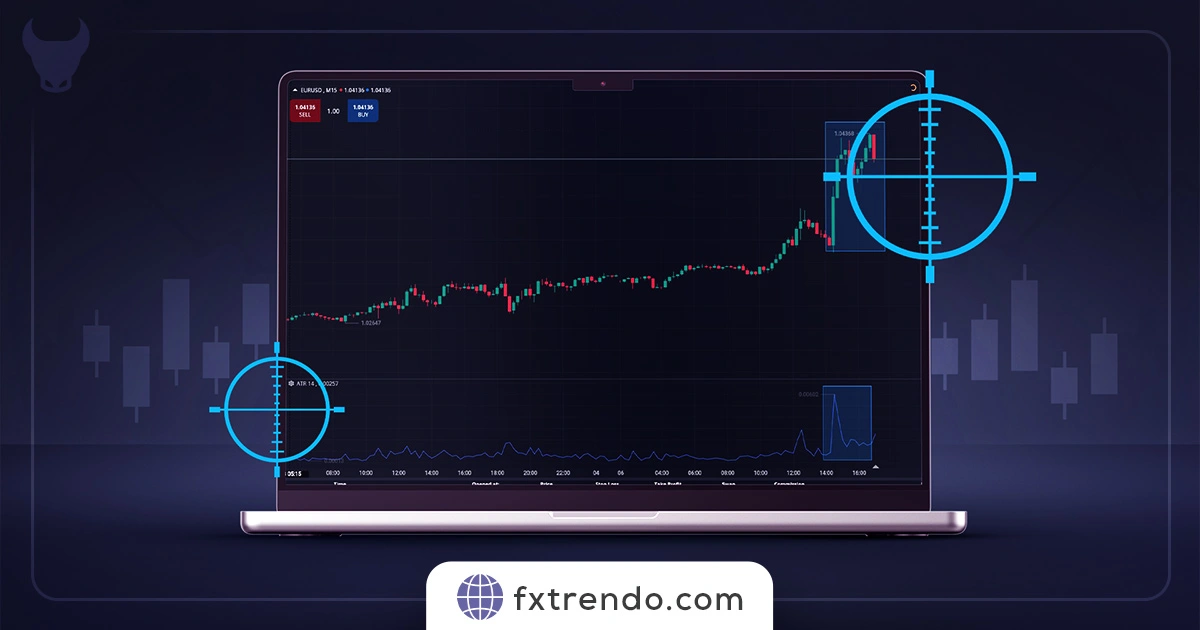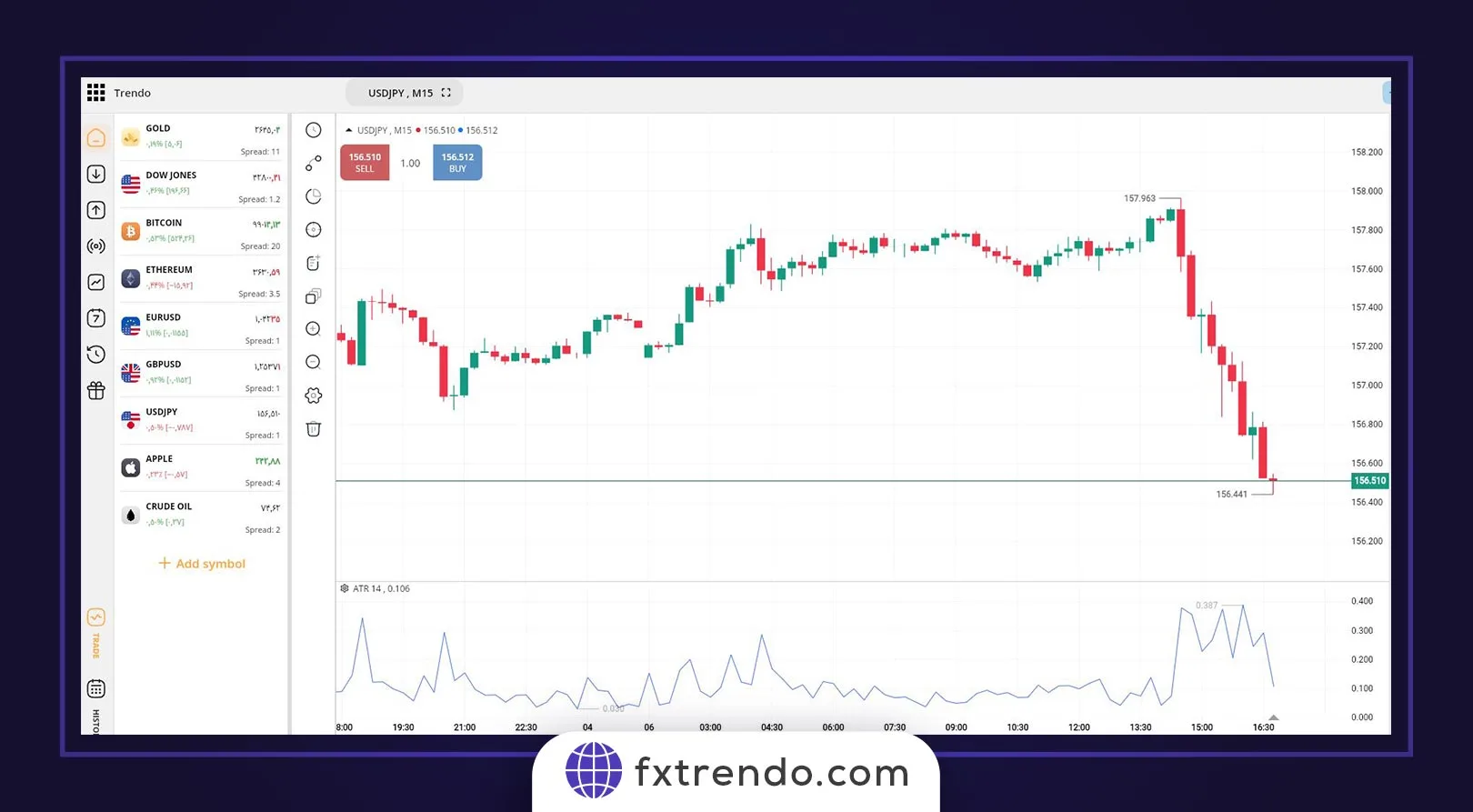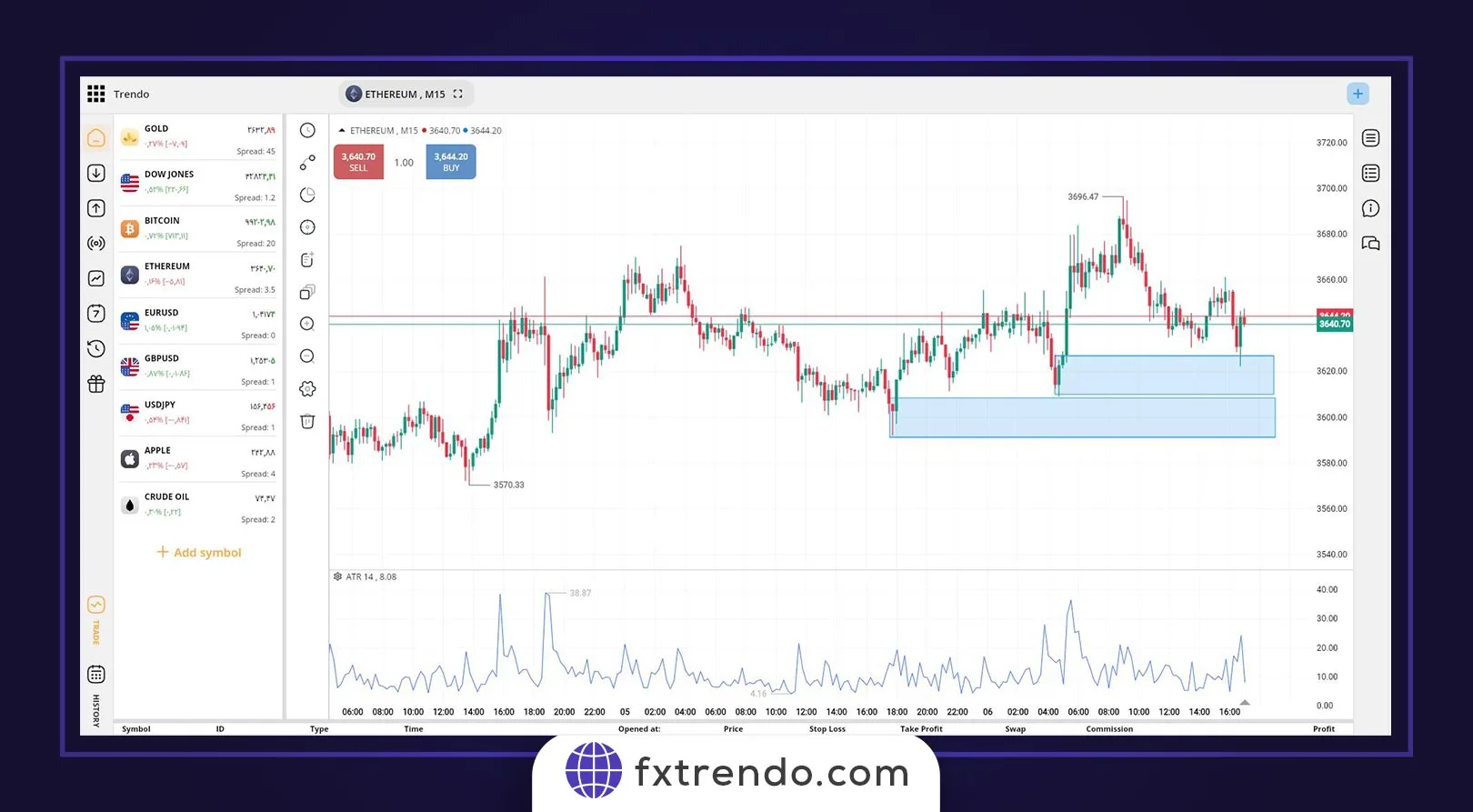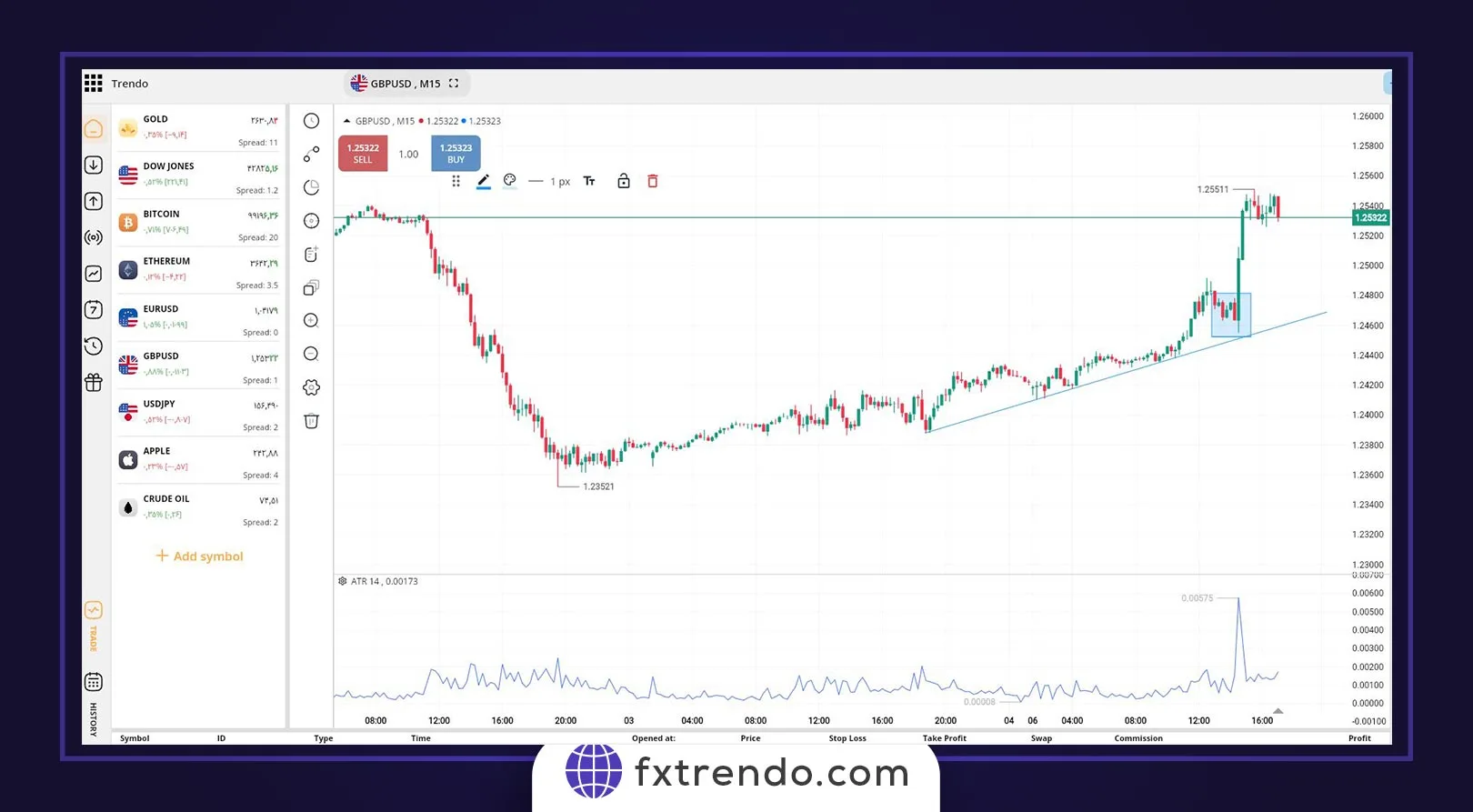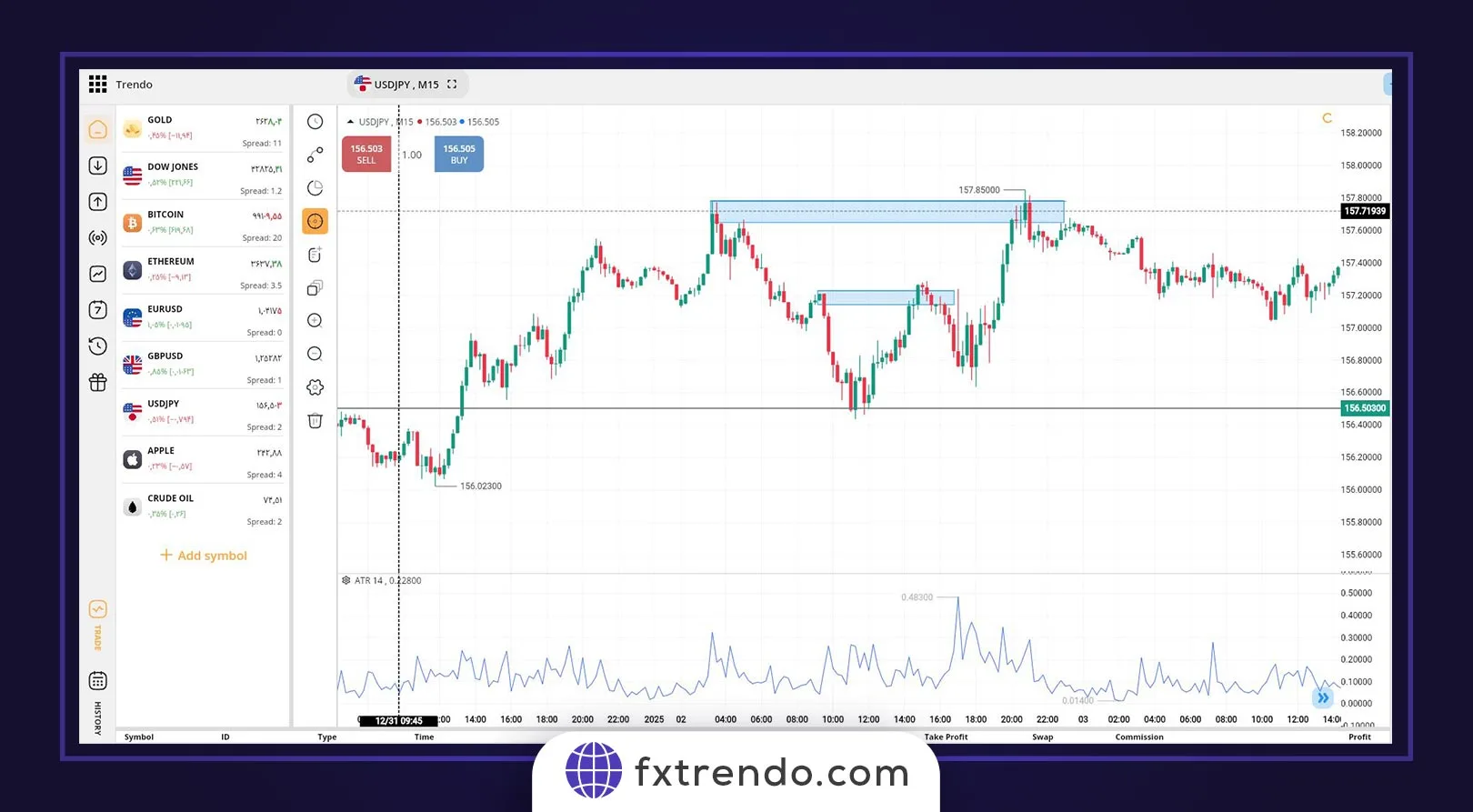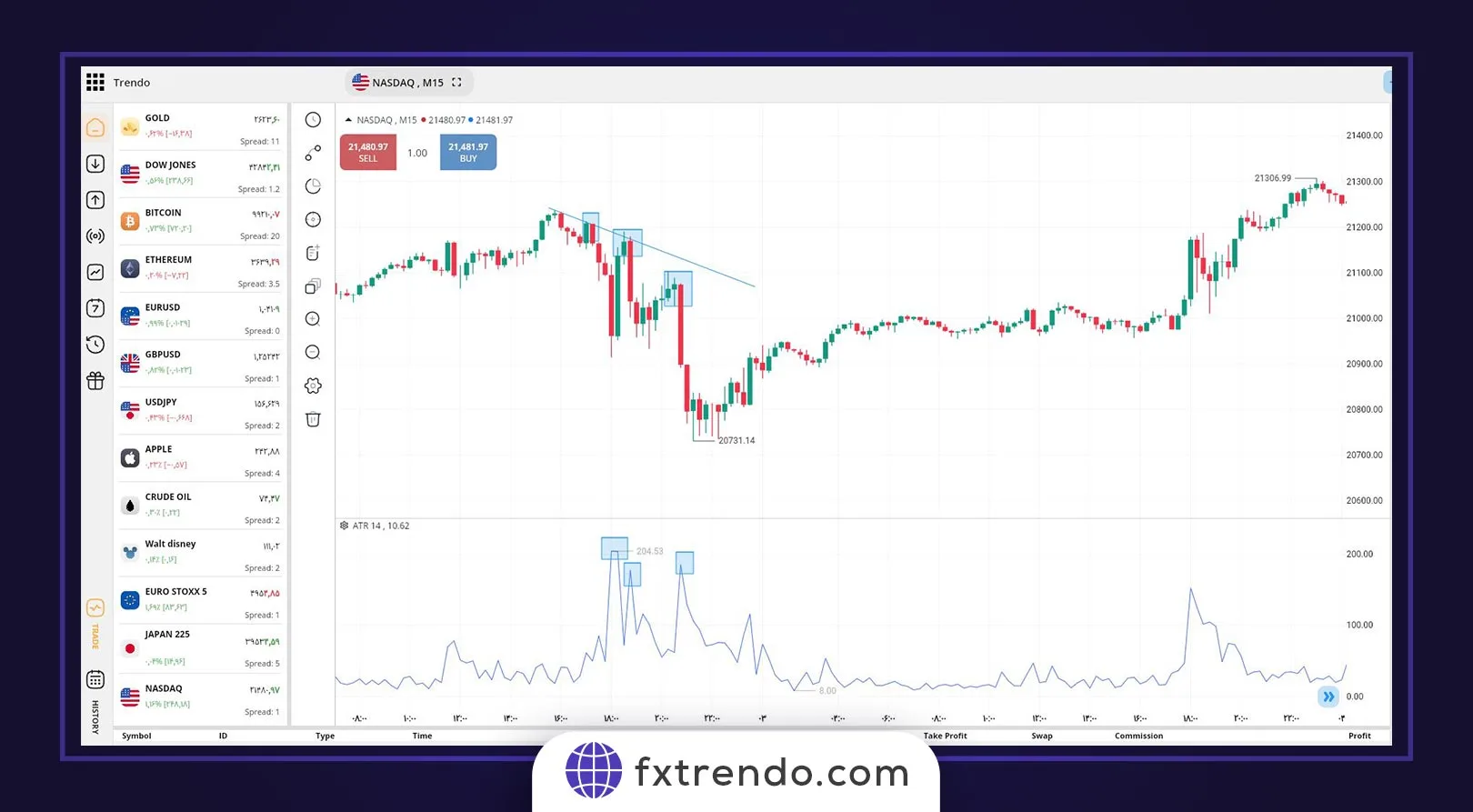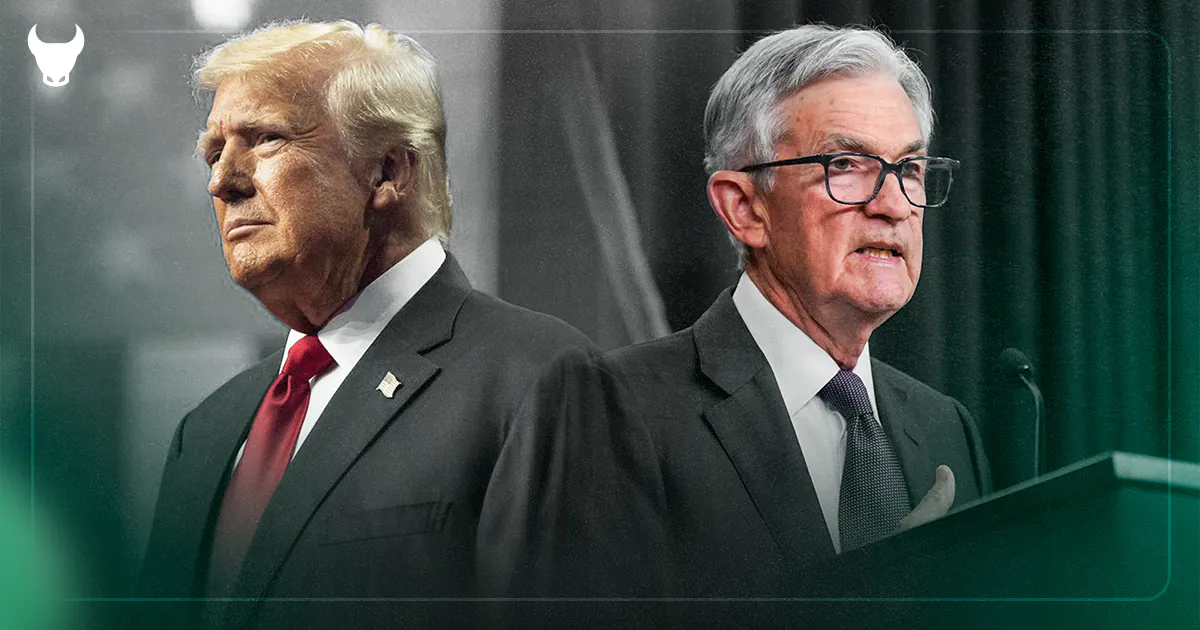Let’s be honest, though— the Sniper Strategy is not for everyone. It’s for those who are patient and dedicated to analysis. If you’re hoping for easy profits without much effort, this might not be the strategy for you.
In this article, we’re going to give you a full breakdown of the Sniper Strategy, from the basic principles to the practical details and expert tips.
So, if you’re curious about why this strategy is so popular among professional traders and how you can use it to succeed in the Forex market, keep reading!
What is the Sniper Strategy?
Imagine yourself as a sniper on the battlefield. Your focus, patience, and precision are all aimed at one goal: taking the shot at the perfect moment for the best result.
The Sniper Strategy is exactly like this, but in the world of trading! It’s one of the most precise and professional approaches to Forex trading, helping you identify key entry and exit points with the highest accuracy possible.
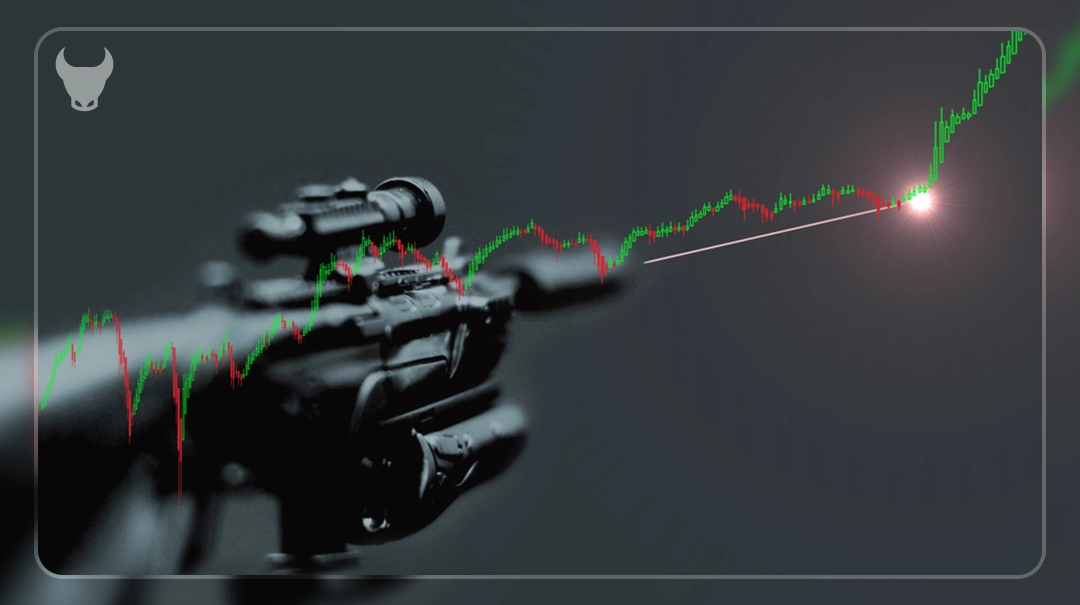
Read more: Forex Market Fundamental News
At the heart of this strategy is price action analysis. This means you focus solely on the price movements, without relying on complex indicators, to spot trading opportunities. The core idea is to wait for the perfect moment, just like a sniper would wait for the best shot, rather than jumping into trades without thought.
The appeal of this method lies in its ability to guide traders toward more accurate decision-making. The Sniper Strategy is particularly suited for individuals who are into deep analysis, patient enough to wait for the right opportunities, and skilled in managing risk.
If you’re someone who wants to approach the market with a professional, well-calculated strategy, then this approach can bring you one step closer to success.
Important Components of the Sniper Strategy
The key details of the Sniper Strategy play a crucial role in a trader’s success. Each component is like a piece of a puzzle, and when combined, they give you a clear picture of the market. Let’s break down the main elements of this strategy:
Bank Levels
Imagine banks as large ships sailing across the vast ocean of Forex. Bank levels are the areas where these large vessels close their trades. The Sniper Strategy designer suggests that the best time to identify these levels is when the daily candle closes at 21:00 Moscow time.
Why? Because this is when banks close their positions to minimize swap costs. Identifying these bank levels helps traders pinpoint key areas in the market for their next moves.
Total Impulse Levels
These levels are like solid fortresses in the market. Total impulse levels, formed on longer timeframes (from 30 minutes to 4 hours), are significant areas of support or resistance. In the Sniper Strategy, these levels act like guiding lights, indicating whether the market is likely to reverse or continue its current direction.
Trend Reversal Levels (LSCT)
Sometimes the market is like a hiker who suddenly decides to change course. Trend reversal levels are the exact points where this change in direction happens. These levels are identified through candlesticks with long shadows in the direction of the trend, often appearing on shorter timeframes (5 to 15 minutes). These signals show that the market is ready to break a level and move in the opposite direction.
Read more: How to trade with a Trendline and set a great strategy
Impulse Levels
Think of impulse levels as small road signs appearing in the winding roads of the market. On a 5-minute timeframe, these levels mark short-term support and resistance points. If you’re looking for precise entry or exit points in your trades, these levels will be your best guide to making informed decisions.
Read more: What are price retracement and reversal trends, and how to identify them?
Consolidation Zone
Have you ever noticed how the market moves slowly during the early hours of the day? These movements usually happen within the consolidation zone, where prices oscillate within a narrow range. These zones often form during the Asian session when trading volumes are lower. Spotting these areas helps you find the optimal moment to enter the market.
By understanding and using these key components, the Sniper Strategy helps traders make informed, well-timed decisions for greater success in the market.
Sniper Strategy Tutorial
In this section, we’ll break down the Sniper Strategy in a simple and straightforward way, so you can make better decisions and apply it effectively in your trades.
Step 1: Determine the Trend on Higher Timeframes
Before diving into details, you need to confirm that the market is trending. Check the 4-hour timeframe to assess the strength of the trend. If the trend is bullish, switch to shorter timeframes (like 15 or 5 minutes) to perform a more detailed analysis and refine your trade entry points.
Step 2: Identify Key Levels from the Previous Day
Use drawing tools to mark the high and low prices of the previous day. Locate the closing candle from the previous day, and draw a rectangular box from its high to its low.
Next, identify at least two key supply and demand zones from the previous day and mark them on your chart. This will give you a minimum of five important areas on the chart that serve as key trading points for the current day.
Step 3: Analyze Price Reaction to Key Zones
Now, switch to the 15-minute timeframe and observe how the price behaves near the identified key zones. Is the price reacting to these areas, or is it breaking through them strongly? If the price pushes through a zone forcefully, don’t rush in! Wait for the price to return to the zone and pull back before making a move.
Step 4: Enter a Trade with Confirmation
If the pullback shows weak candlesticks, it’s a sign of buyer strength, and you can enter a buy trade with confirmation. However, if the pullback forms strong bearish candles, the area may be breaking down, signaling a potential price reversal. In this case, hold off on entering the trade and wait for the next opportunity.
Step 5: Importance of Confirmation and Risk Management
Entering a trade without confirmation is like walking into a minefield! Confirmations can increase your trade accuracy by up to 70%. Always set a stop loss and stick to it—this is vital for managing risk and ensuring long-term success in trading.
Step 6: Use the ATR Indicator for Better Accuracy
For even more precision in marking support and resistance zones, consider using the ATR (Average True Range) indicator. This tool helps you set the height of the zones based on the average price fluctuations (e.g., 6 to 10 pips), making your analysis more accurate.
If the overall market trend is bullish, avoid selling in broken levels, as it may be a trap. Be patient and look for the next buying opportunity. A true sniper always waits for the perfect moment—not just any moment.
By following this step-by-step approach and maintaining discipline, you’ll be able to apply the Sniper Strategy effectively, enhancing your trading performance and improving your decision-making.
Different Versions of the Sniper Strategy
The Sniper Strategy has evolved over time, with different styles and approaches emerging to cater to the needs and experiences of various traders.
Each version of the strategy emphasizes specific aspects of the market, allowing traders to tailor their approach based on their individual preferences and trading objectives. Below, we explore some of the key versions of the Sniper Strategy:
Classic Sniper Version
The Classic Sniper is the foundational version of the strategy, focusing primarily on price action analysis and identifying key support and resistance levels. In this approach, traders rely solely on price movements to spot trading opportunities, avoiding complex indicators. This version is ideal for traders who prefer simple, clean analysis without the use of additional technical tools.
Advanced Sniper Version
The Advanced Sniper takes the Classic Sniper a step further by incorporating more tools and indicators, such as the ATR (Average True Range), to improve accuracy in identifying key levels. In addition, advanced traders also look for confirmation signals, such as confirming candlesticks or divergences, before entering trades. This version is best suited for traders with more experience, as it offers greater precision and deeper market insights.
Scalping Sniper Version
The Scalping Sniper is designed for traders who focus on short-term trades, typically on lower timeframes such as 1-minute or 5-minute charts. The main focus here is on quick reactions to price movements and taking small but frequent profits. This version is ideal for traders who are quick decision-makers, with a high level of focus and the ability to capitalize on small market movements.
Supply and Demand Sniper Version
This version of the Sniper Strategy emphasizes supply and demand zones as key market areas. Traders using this approach aim to identify price regions where large institutions, like banks, are making significant transactions. This strategy is especially useful in markets with lower volatility, as it helps traders spot opportunities in less erratic market conditions.
ICT-Based Sniper Version (Inner Circle Trader)
Inspired by the ICT (Inner Circle Trader) concepts, this version incorporates more complex market analysis, such as liquidity grabs and trade traps. Traders using the ICT-based Sniper version focus on identifying weaknesses in the market and movements driven by smart money. This version is for traders who are comfortable with more advanced techniques and want to exploit market inefficiencies for profit.
Hybrid Sniper Version
The Hybrid Sniper combines elements from different Sniper versions, integrating strategies like RTM (Return to Mean) and Classic Price Action. This version gives traders more flexibility, allowing them to choose the best tools and techniques based on the current market conditions. By blending different strategies, traders can adjust their approach for greater versatility in a variety of market environments.
Each of these versions of the Sniper Strategy offers a unique approach, catering to different trader preferences and skill levels. Whether you’re a beginner looking for simplicity or an experienced trader seeking advanced techniques, there’s a Sniper version to suit your style and goals.
Advantages of the Sniper Strategy
1. High Accuracy in Identifying Entry and Exit Points
One of the primary advantages of the Sniper Strategy is its high accuracy in pinpointing the most optimal entry and exit points. By focusing on precise price action and key market levels, traders can enter trades with a higher degree of certainty, reducing the chances of making poor decisions and increasing the potential for profitable outcomes.
2. Reduced Risk in Trading
The Sniper Strategy places a strong emphasis on risk management by carefully analyzing market conditions and waiting for the ideal setup before entering a trade. This method helps traders avoid impulsive decisions, reducing the overall risk associated with trades.
By relying on solid market analysis and confirmation signals, the strategy allows for more calculated risk-taking, which is essential for long-term success.
3. Suitable for All Timeframes
Whether you prefer to trade on short-term charts or longer timeframes, the Sniper Strategy is versatile enough to work across all timeframes. Traders can adapt this strategy to different market conditions and choose the timeframe that best suits their trading style. This flexibility makes it a valuable tool for a wide range of traders, from scalpers to swing traders.
4. Focus on Price Action and Simple Analysis
The Sniper Strategy prioritizes price action over complex indicators, making it an excellent choice for traders who prefer a straightforward, no-frills approach.
By observing price movements and key support/resistance levels, traders can make informed decisions without relying on numerous technical indicators. This simplicity in analysis makes the strategy easy to understand and apply, even for beginners.
5. Effective Time Management in Trading
The Sniper Strategy is designed to optimize time management by allowing traders to focus on key market events and avoid unnecessary trading noise. This strategic approach ensures that traders can spend less time in front of the screen, waiting for the perfect opportunity to enter or exit a trade.
This efficiency makes the strategy ideal for traders who want to make the most of their time while still capitalizing on market opportunities.
6. Optimized Stop Loss and Take Profit Levels
By carefully analyzing the market and identifying key levels, the Sniper Strategy helps traders set more accurate stop loss and take profit levels. This optimized approach to trade management allows for better risk-to-reward ratios, ensuring that traders can maximize their potential profits while minimizing losses.
Effective stop loss and take profit placement is essential for long-term trading success, and the Sniper Strategy delivers on this front.
7. Strong Trading Signals
The Sniper Strategy generates powerful trading signals by focusing on key market zones and price action patterns. These signals are often more reliable and effective than those generated by complex indicators, as they are based on real-time market behavior. As a result, traders can make decisions with greater confidence, knowing that the signals they are following have a higher probability of success.
8. Increased Profitability in Strong Trends
The Sniper Strategy is particularly effective during strong market trends, as it helps traders align their trades with the prevailing market direction. By waiting for the right opportunities within established trends, traders can take advantage of larger price movements and potentially increase their profitability.
The Sniper Strategy offers a range of advantages that can help traders improve their performance and increase their chances of success. With its focus on precision, risk management, and simplicity, this strategy is well-suited to traders of all experience levels and across various market conditions.
Whether you’re looking for better entry/exit points, reduced risk, or increased profitability, the Sniper Strategy provides the tools you need to succeed in the competitive world of trading.
Disadvantages of the Sniper Strategy
While the Sniper Strategy offers numerous benefits, it is not without its challenges. Below are some of the potential disadvantages that traders should consider before adopting this approach:
1. Requires Patience and a Lot of Time
The Sniper Strategy demands a great deal of patience. It is a method that requires waiting for the perfect setup before making any trades, which means that traders may find themselves sitting on the sidelines for extended periods.
This can be difficult for traders who prefer quick, frequent trades or are looking for instant results. The strategy isn’t about rushing in but waiting for the right moment, which can be time-consuming and sometimes frustrating.
2. Not Suitable for Sideways Markets
The Sniper Strategy thrives in trending markets where price movement is more predictable. However, it is less effective in sideways or ranging markets, where prices move within a narrow range.
In these conditions, the key levels that the strategy relies on may not provide reliable entry and exit points. Traders may find it harder to execute successful trades, as price action tends to lack the momentum required for the strategy to work effectively.
3. Complexity in Identifying Key Levels
Identifying key support and resistance levels can be a challenge, especially for traders who are new to the Sniper Strategy. The strategy relies heavily on pinpointing these levels with high precision, and any mistake in this process can lead to incorrect trade decisions.
As a result, it may take time for traders to develop the skills needed to accurately identify these crucial points on the chart, which could hinder their success initially.
4. Sensitivity to News and Sudden Market Fluctuations
The Sniper Strategy can be sensitive to market news and sudden fluctuations. Unexpected news events or geopolitical developments can cause significant price movements that may not align with the expected trends or market levels.
This can lead to market conditions that are hard to predict, making it difficult for the Sniper Strategy to generate accurate signals. Traders using this strategy need to be cautious of news events that can disrupt their planned trades.
5. Requires High Levels of Practice and Experience
While the Sniper Strategy is highly effective for skilled traders, it requires substantial experience and practice to use it successfully. The strategy is not suitable for beginners who are still learning the ropes of trading. It demands a deep understanding of price action, market behavior, and risk management.
Without sufficient practice, even experienced traders may struggle to apply the strategy correctly in real-market conditions.
6. Heavy Focus on Chart Analysis
The Sniper Strategy places a strong emphasis on chart analysis, which can be mentally taxing for some traders. Constantly analyzing price movements, support and resistance levels, and patterns can be overwhelming, especially for those who are not used to spending long hours in front of the screen.
This level of focus and attention to detail can sometimes lead to fatigue and burnout, particularly for traders who don’t have the patience or time to dedicate to charting consistently.
7. Risk of Misinterpreting Key Levels
Since the Sniper Strategy relies heavily on identifying and interpreting key market levels, there is always the risk of misinterpreting these levels. A small error in identifying a key support or resistance point can result in entering a trade at the wrong time, which could lead to losses.
Misinterpretation of market conditions or failure to spot subtle changes in price action can be detrimental to a trader’s success with this strategy.
8. Not Suitable for Impatient Traders
The Sniper Strategy requires a calm, patient approach and is not ideal for traders who are impulsive or prefer quick decisions. Traders who are prone to acting on their emotions or rushing into trades may find this strategy frustrating.
Since it requires waiting for the perfect market conditions to develop, traders who seek instant gratification or quick results may struggle with the Sniper Strategy’s slow-paced nature.
While the Sniper Strategy offers many advantages, it also comes with its own set of challenges. It requires patience, experience, and a keen understanding of price action.
Traders who are not comfortable with long waiting times, complex chart analysis, or managing risk in unpredictable markets may find the strategy difficult to implement successfully.
However, for those who are willing to invest the time and effort to master it, the Sniper Strategy can be a powerful tool for achieving consistent trading success.
Important Tips for Using the Sniper Strategy in Forex Trading
The Sniper Strategy is a powerful tool for traders, but success in implementing it goes beyond just understanding the basic principles. To truly excel, there are some key tips that can elevate you from a regular trader to a skilled Sniper. Below are some important strategies and tips to keep in mind:
1. Prioritize Patience and Calmness
This strategy is not for impatient traders. Success with the Sniper Strategy requires waiting for the perfect market conditions before entering a trade. You must exercise patience and not act impulsively. Trust that the best setups will come to you if you stay disciplined and wait for the right signals.
2. Analyze Multiple Timeframes Together
Always begin your analysis with higher timeframes to understand the overall market trend. Once you’ve identified the larger trend, shift to lower timeframes to pinpoint the exact entry and exit points. By aligning your decisions across different timeframes, you increase the accuracy of your trades.
3. Identify Key Levels with Precision
The foundation of the Sniper Strategy is identifying key support, resistance, and supply/demand levels. It’s crucial to draw these levels with precision, as they help you spot significant entry points. Using tools like the ATR (Average True Range) indicator can help you optimize these levels and ensure you’re targeting the most relevant price zones.
4. Don’t Forget Risk Management
Before entering any trade, always set a stop-loss and take-profit level. This is a critical aspect of controlling risk and ensuring that even if a trade doesn’t go in your favor, your losses remain manageable. Having a well-thought-out risk management plan can protect you from significant setbacks and help keep your trading consistent.
5. Analyze Price Reactions Carefully
When the price approaches key levels, don’t rush into a trade. Watch how the price reacts once it hits these zones. Is it holding strong or breaking through with momentum? Being patient and observing how the price behaves at these critical points can give you valuable insight into whether or not it’s the right time to enter a trade.
6. Use Confirmations Before Trading
Confirmation is key to increasing your chances of success. Always wait for a confirmation, such as a breakout from a key zone or a well-formed pullback, before entering a trade. By waiting for these signs, you can avoid making premature decisions and increase the likelihood of successful trades.
7. Never Trade Based on Emotions
Emotional decision-making is one of the biggest obstacles in trading. Whether driven by fear or greed, trading based on emotions can lead to impulsive actions that undermine your strategy. Stick to your analysis and trading plan, and avoid reacting to market fluctuations with haste or panic.
8. Avoid Trading in Ranging Markets
The Sniper Strategy works best in trending markets. In ranging or low-volatility markets, where price moves in a tight range, the strategy may not provide reliable setups. Before placing a trade, ensure that a strong trend is present in the market. Trading in choppy or sideways markets can often lead to missed opportunities or false signals.
9. Practice, Practice, Practice
Before applying the Sniper Strategy to a live account, test it thoroughly on a demo account. Practice helps you familiarize yourself with the strategy, identify your strengths and weaknesses, and build the confidence needed to trade effectively. Consistent practice will help refine your skills and ensure that you’re prepared when you transition to real money trading.
10. Keep an Eye on News and Important Events
Market moves can be highly influenced by news and economic events. Unexpected events can quickly disrupt your key levels, invalidating your analysis. Always check the economic calendar to be aware of major news releases, and avoid trading during high-impact news events. This will help you avoid the risk of sudden volatility that could jeopardize your trades.
The Sniper Strategy is both precise and sophisticated, but it requires focus, patience, and experience. By following these key tips, you can significantly improve your chances of success and move toward becoming a professional trader.
Conclusion
In trading, success belongs to those who combine knowledge with patience and discipline. The Sniper Strategy offers a clear path for traders who want to go beyond the ordinary and approach the Forex market with precision and confidence. However, it’s essential to remember that this strategy works best for those willing to invest the time and energy needed to learn and practice. Don’t rush; like a true sniper, wait for those golden opportunities.
The Forex market is full of ups and downs, and only those equipped with professional tools, like the Sniper Strategy, can capitalize on these fluctuations. Give yourself the time to develop the necessary skills and remain patient and committed throughout the journey. Remember, you’re here to grow, not gamble! Your future depends on the choices you make today.
Frequently Asked Questions
What type of traders is the Sniper Strategy suitable for?
Can the Sniper Strategy be used in markets other than Forex?
Yes, the Sniper Strategy can be used in markets like stocks, commodities, and indices. Its focus on price action and key support and resistance levels makes it effective across different financial markets. However, traders should consider the unique characteristics of each market, such as volatility and liquidity, which can impact the strategy’s performance. Adapting it to
